JAJSPU7 June 2024 LMR36503E-Q1
PRODUCTION DATA
- 1
- 1 特長
- 2 アプリケーション
- 3 概要
- 4 Device Comparison Table
- 5 Pin Configuration and Functions
- 6 Specifications
-
7 Detailed Description
- 7.1 Overview
- 7.2 Functional Block Diagram
- 7.3
Feature Description
- 7.3.1 Enable, Start-Up, and Shutdown
- 7.3.2 External CLK SYNC (with MODE/SYNC)
- 7.3.3 Adjustable Switching Frequency (with RT)
- 7.3.4 Power-Good Output Operation
- 7.3.5 Internal LDO, VCC UVLO, and VOUT/BIAS Input
- 7.3.6 Bootstrap Voltage and VCBOOT-UVLO (CBOOT Terminal)
- 7.3.7 Output Voltage Selection
- 7.3.8 Soft Start and Recovery from Dropout
- 7.3.9 Current Limit and Short Circuit
- 7.3.10 Thermal Shutdown
- 7.3.11 Input Supply Current
- 7.4 Device Functional Modes
-
8 Application and Implementation
- 8.1 Application Information
- 8.2
Typical Application
- 8.2.1 Design Requirements
- 8.2.2 Detailed Design Procedure
- 8.2.3 Application Curves
- 8.3 Best Design Practices
- 8.4 Power Supply Recommendations
- 8.5 Layout
- 9 Device and Documentation Support
- 10Revision History
- 11Mechanical, Packaging, and Orderable Information
8.2.3 Application Curves
Unless otherwise specified the following conditions apply: VIN = 12.0V, TA = 25°C. Figure 8-25 shows the circuit with the appropriate BOM in Table 8-4

| VOUT = 3.V | 2.2MHz (AUTO) | 25°C |

| VOUT = 5V | 2.2MHz (AUTO) | 25°C |

| VOUT = 3.3V | 2.2MHz (AUTO) | 150°C |

| VOUT = 5V | 2.2MHz (AUTO) | 150°C |
 Figure 8-12 Line and Load Regulation
Figure 8-12 Line and Load Regulation
| VOUT = 5V | 0.02A to 0.3A, 1A/µs | 2.2MHz (AUTO) |

| VOUT = 5V | IOUT = 0A | 2.2MHz (AUTO) |
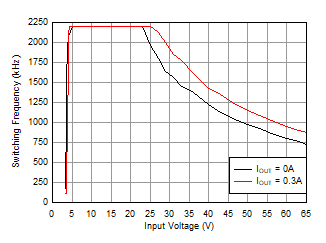
| VOUT = 3.3V | 2200kHz | FPWM |
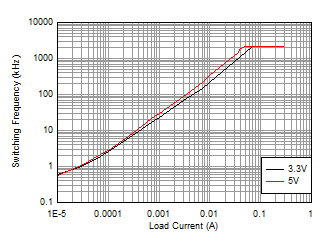
| VOUT = 3.3V | VIN = 13.5V |
| VOUT = 5V | AUTO |
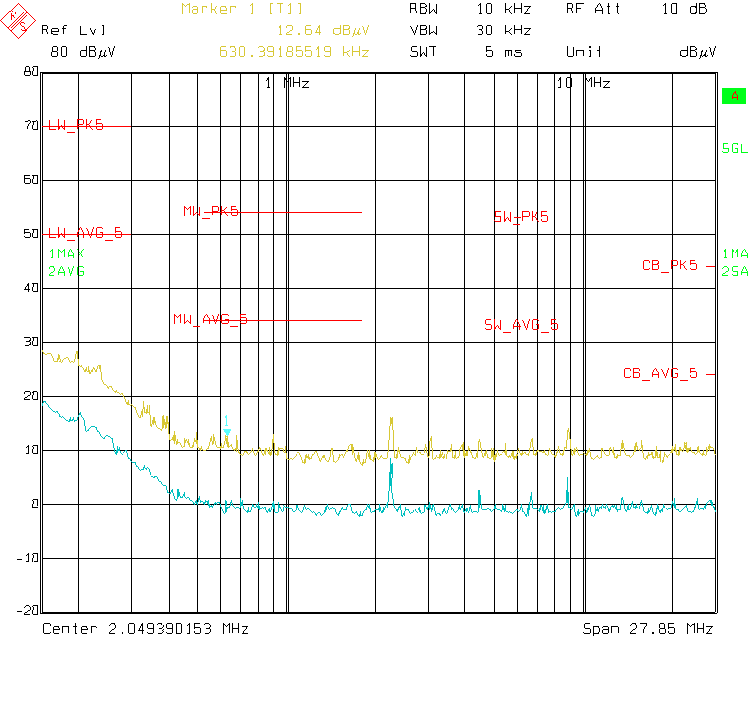
| VIN = 13.5V | VOUT = 5V | Fsw = 2.2MHz |
| Load = 0.3A |

| VOUT = 3.V | 2.2MHz (FPWM) | 25°C |

| VOUT = 5V | 2.2MHz (FPWM) | 25°C |

| VOUT = 3.3V | 2.2MHz (FPWM) | 150°C |

| VOUT = 5V | 2.2MHz (FPWM) | 150°C |
 Figure 8-13 Dropout
Figure 8-13 Dropout
| VOUT = 5V | 0.15A to 0.3A, 1A/µs | 2.2MHz (AUTO) |

| VOUT = 5V | IOUT = 300mA | 2.2MHz (AUTO) |
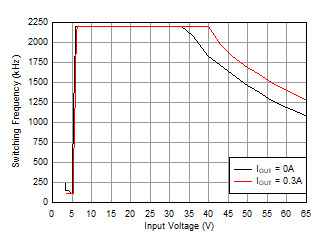
| VOUT = 5V | 2200kHz | FPWM |
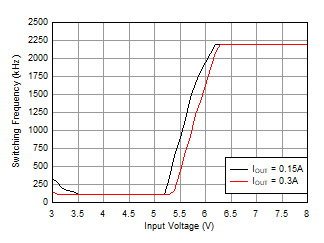
| VOUT = 5V | AUTO |
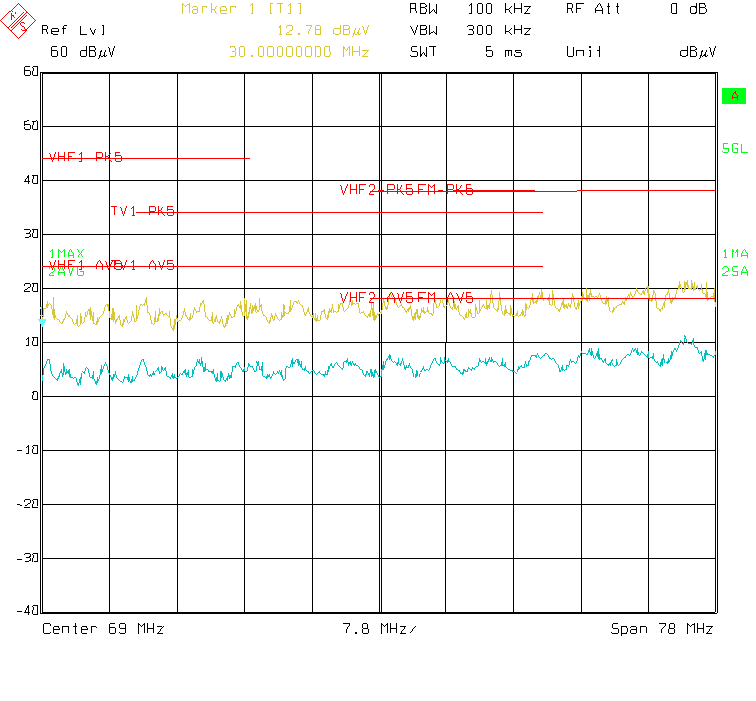
| VIN = 13.5V | VOUT = 5V | Fsw = 2.2MHz |
| Load = 0.3A |

| Ferrite bead part number: FBMH3225HM601NT |
 Figure 8-25 Schematic for Typical Application Curves
Figure 8-25 Schematic for Typical Application CurvesTable 8-4 BOM for Typical Application Curves
| U1 | ƒSW | VOUT | L | NOMINAL COUT (RATED CAPACITANCE) |
|---|---|---|---|---|
| LMR36503MSCERPERQ1 | 2200kHz | 3.3V | 6.8µH, 47.9mΩ | 2 × 22µF |
| LMR36503MSCERPERQ1 | 2200kHz | 5V | 6.8µH, 47.9mΩ | 2 × 22µF |